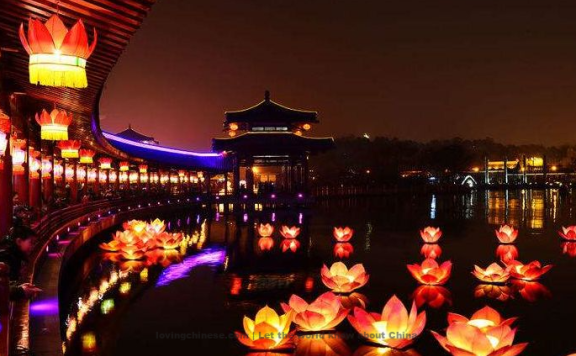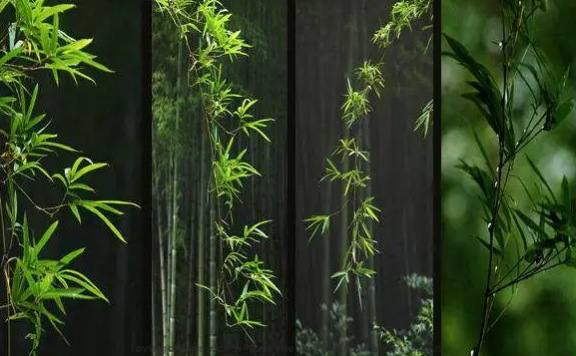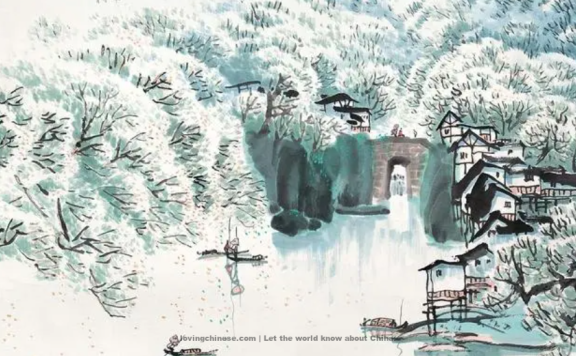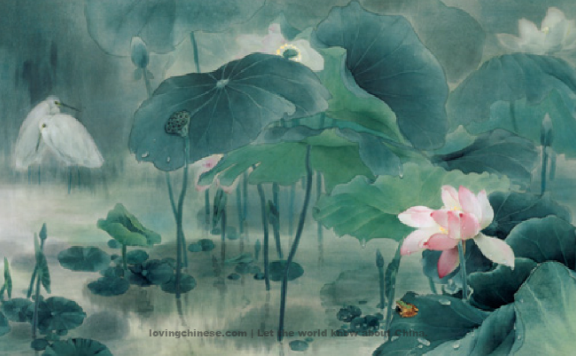-
Zhou Bangyan: Broken Lotus Root (To the Tune of Yulouchun) ~ 《玉楼春·桃溪不作从容住》 周邦彦 with English Translations
This poem describes the love between an immortal and a mortal. The poem begins by mentioning Taoxi and quoting the story of Liu and Ruan meeting an immortal, expressing pity for their shallow fate. The poem is written lightly and is euphemistic and moving, while the phrase "autumn lotus root" is emphasized. "Peach Creek" and "autumn lotus root" are one dark and one bright, marking the spring and autumn seasons, implying the difference between the past and the present. "Then" and "Today" are in sharp contrast and show deep feelings. "Red Railing Bridge" and "Yellow Leaf Road" are another dark and one bright, marking the spring and autumn seasons. The ending phrases "People are like" and "Feelings are like" integrate the feelings well. The whole poem is full of feelings in every sentence and every word, and the poem is connected and connected, like pearls on a string. 这首词是描写仙凡恋爱的。开头点出桃溪,引用刘、阮遇仙之典故自怜缘浅。轻写一笔,委婉动人,“秋藕”句重顿一笔。而“桃溪”、“秋藕”一暗一明,分点春秋,暗寓昔今不同。“当时”、“今日”,对比强烈情深意切。而“赤栏桥”、“黄叶路”又是一暗一明,分点春秋。“人如”、“情似”的结尾句,工整合情。全词句句含情,字字含情,前后照应,累累如贯珠。 《玉楼春·桃溪不作从容住》 周邦彦 桃溪不作从容住,秋藕绝来无续处。当时相候赤栏桥,今日独寻黄叶路。 烟中列岫青无数,雁背夕阳红欲暮。人如风后入江云,情似雨余粘地絮。 Broken Lotus Root(To the Tune of Yulouchun) Zhou Bangyan Young, we threw away the pastoral years.Now like a broken lotus root it is,impossible to join the presentand the past. Then,we waited for each other,standing by the vermilion-railed bridge.Today, I search for the traces, in van,along the deserted…- 54
- 0
-
Zhou Bangyan: Joy of the Young (To the Tune of Shaonianyou) ~ 《少年游·并刀如水》 周邦彦 with English Translations
This poem was written by the author by recounting his own experience in Qinlou and Chuguan, expressing the pain in his heart of enduring the teasing, flirting and incest between his sweetheart and the emperor. 这首词,是作者通过追述自己在秦楼楚馆中的一段经历所作,抒发心中忍受心上人与皇帝戏虐调情、颠龙倒凤痛苦。 《少年游·并刀如水》 周邦彦 并刀如水,吴盐胜雪,纤手破新橙。锦幄初温,兽香不断,相对坐调笙。低声问:向谁行宿?城上已三更。马滑霜浓,不如休去,直是少人行! Joy of the Young(To the Tune of Shaonianyou) Zhou Bangyan The knife from Bing sharp as water,the salt from Wu white as snow,she cuts for him a fresh orangein her slender fingers.Behind the newly warmed brocade curtain,the incense incessantly risingfrom the animal-shaped burner,they sit opposite each other,tuning up their reed pipe instruments.Softly she inquires:"Where are you going to spend the night?It's the third watch on the city wall,the frost thick, the road too slipperyfor the horse. Don't leave.Really, few people walk outside."- 61
- 0
-
Zhou Bangyan: Silk-washing Stream ~ 《浣溪沙·翠葆参差竹径成》 周邦彦 with English Translations
Zhou Bangyan (1056-1121) was a poet in the Northern Song Dynasty. His courtesy name was Meicheng and his pseudonym was Qingzhen Jushi. He was from Qiantang (now Hangzhou, Zhejiang). He served as the principal of the Imperial College, a professor of Luzhou, and the magistrate of Lishui County. He was a relatively unfocused person in his youth, but he loved reading very much. During the reign of Emperor Shenzong of Song, he wrote "Fu of Biandu" to praise the new law. During the reign of Emperor Huizong, he served as the attendant of Huiyou Pavilion and the director of Dashengfu (the highest music agency). He was proficient in music and had created many new tunes. Most of his works were about love and travel, and there were also works about objects. His rhythm was strict, his language was elegant and graceful, and he was especially good at narrating long tunes. He was the model of later poets of the rhythm school. His works were long respected as "authentic" among the graceful poets. The old theory of poetry called him "the crown of poets" or "Lao Du in poetry". There is "Qingzhen Jushi Collection", which has been lost, and "Pianyu Collection"…- 79
- 0
-
Zhou Bangyan: Silk-washing Stream ~ 《浣溪沙·争挽桐花两鬓垂》 周邦彦 with English Translations
"Huanxisha: Fighting to hold the tung flowers and hanging down my temples" is a poem written by Zhou Bangyan, a poet of the Northern Song Dynasty. The first part of the poem describes the innocence and lively laughter of the little girls; the second part describes their being disciplined and sad, and the girls' lives are actually not cared about at all. This poem organically combines multiple scenes together, with a strong contrast, which makes people feel pity when reading it. 《浣溪沙·争挽桐花两鬓垂》是北宋词人周邦彦所写的一首词。词的上片写小女孩们的天真烂漫和活泼笑闹;下片写出她们备受管束、内心悲伤,女孩们的生活冷暖实际上丝毫不被关心。这首词将多个画面有机地组合到一起,对比强烈,读之令人怜惜。 《浣溪沙·争挽桐花两鬓垂》 周邦彦 争挽桐花两鬓垂,小妆弄影照清池。出帘踏袜趁蜂儿。跳脱添金双腕重,琵琶拨尽四弦悲。夜寒谁肯剪春衣? Silk-washing Stream Zhou Bangyan Trying to pin on forehead flowers from plane-trees,She gazed on her make-up mirrored in water clear,And went outdoors on stocking feet to chase the bees.Skipping, she felt her arms heavy with bracelets gold;Playing pipa, she feels its four strings sad and drear.Who would like to cut a vernal coat on a night cold?- 62
- 0
-
Zhou Bangyan: Silk-washing Stream ~ 《浣溪沙·楼上晴天碧四垂》 周邦彦 with English Translations
"Huanxisha: The Blue Sky on the Tower is Clear" is a poem written by Zhou Bangyan, a poet of the Northern Song Dynasty, which expresses the poet's feelings of regret for spring and loneliness in a foreign land. The two parts of this poem echo each other, twists and turns, and linger. The homesickness expressed in it is sad, gentle, strong and touching. 《浣溪沙·楼上晴天碧四垂》是北宋词人周邦彦所作的一首伤春词,抒写了词人的惜春伤怀之感,以及词人独处异乡的孤寂之情。这首词的上下两片相互呼应、委曲纡折、萦回复沓,其中表现出的乡情凄迷婉转,强烈而感人。 《浣溪沙·楼上晴天碧四垂》 周邦彦 楼上晴天碧四垂,楼前芳草接天涯。劝君莫上最高梯。新笋已成堂下竹,落花都上燕巢泥。忍听林表杜鹃啼? Silk-washing Stream Zhou Bangyan The azure sky hangs down on four sides of the tower;Green grass before it stretches as far as the sky.I would advise you not to mount the tower high.New shoots have grown into bamboos before my bower;The swallows' nest's adorned with petals of fallen flower.How can I bear to hear cuckoos' home-going cry?- 70
- 0
-
Zhou Bangyan: Hong Chuang Hui ~ 周邦彦·《红窗迥》 with English Translations
Zhou Bangyan (1056-1121) was a famous poet in the Northern Song Dynasty. His courtesy name was Meicheng and his pseudonym was Qingzhen Jushi. He was from Qiantang (now Hangzhou, Zhejiang). He served as the principal of the Imperial College, a professor of Luzhou, and the magistrate of Lishui County. He was a relatively scattered person in his youth, but he loved reading very much. During the reign of Emperor Shenzong of Song, he wrote "Fu of Biandu" to praise the new law. During the reign of Emperor Huizong, he served as the attendant of Huiyou Pavilion and the director of Dashengfu (the highest music agency). Zhou Bangyan was proficient in music and had created many new tunes. Most of his works were about boudoir love and travel, and there were also works about objects. His rhythm was strict, his language was elegant and graceful, and he was especially good at narrating long tunes. He was the model of later poets of the rhythmic school. His works were long respected as "authentic" among the graceful poets. The old theory of poetry called him "the crown of poets" or "Lao Du in poetry". He was recognized as a poet who "beared the…- 66
- 0
-
Zhou Bangyan Poem: Universal Joy – 周邦彦《齐天乐·正宫秋思》
"Zhou Bangyan Poem: Universal Joy" is the work of Zhou Bang Yan, a lyricist of the Song Dynasty.- 34
- 0
-
Zhou Bangyan Poem: Courtyard Full of Fragrance · Write on a Summer Day in Wu Xiang Hill – 周邦彦《满庭芳·夏日溧水无想山作》
"Courtyard Full of Fragrance · Write on a Summer Day in Wu Xiang Hill " is a lyric composed by Zhou Bangyan, a lyricist of the Northern Song Dynasty.- 28
- 0
-
Zhou Bangyan Poem: Intelligent Flower· Lantern Festival – 周邦彦《解语花·高平元宵》
解语花上元 周邦彦 风销焰蜡,露浥[1]红莲[2],花市光相射。桂华[3]流瓦。纤云散,耿耿素娥欲下[4]。衣裳淡雅。看楚女[5]、纤腰一把。箫鼓喧,人影参差,满路飘香麝[6]。因念都城放夜[7]。望千门如昼,嬉笑游冶。钿车[8]罗帕。相逢处,自有暗尘随马。年光是也。唯只见、旧情衰谢。清漏[9]移,飞盖[10]归来,从舞休歌罢。 注释:[1]浥:沾湿,打湿。[2]红莲:这里指灯笼,有些灯笼做成莲花灯的形状。[3]桂华:代指月亮,月光。古代传说中月中有桂树,后以此来代指月亮。[4]“耿耿”句:耿耿,光明的样子。素娥,嫦娥,传说月中的女神。[5]楚女:古代楚地的美女。《韩非子》:“楚灵王好细腰,而国中多饿人。”[6]香麝:麝香。麝,兽名,似鹿而小,雄麝腹部有香腺,它的分泌物乃是贵重的香料。[7]放夜:古代的“金吾放夜”。古代京城禁止夜行,唯正月十五夜警卫之士解除宵禁,市民可欢乐通宵,称作“放夜”,不但官家“放夜”,而且“私家”也“放门”。古代妇女也是足不出户,唯有这一天可以走出闺门,到街巷中去看灯赏景。[8]钿车:装饰豪华的车子。[9]漏:漏壶。古代一种计时器。[10]飞盖:车盖,古代车上像伞的篷子。 Intelligent Flower· Lantern Festival Zhou Bangyan The candle flames redden the breeze;The lotus lanterns seem to freeze.The sky brightens the fair and the fair the sky.The tiles are steeped in moonlightWhen fleecy clouds disperse in flight,The Moon Goddess would come down from on high.In elegant dress appearThe southern maidens tenderWith waist so slender.The drums boom far and near,The crowd's shadows rise and fall,Fragrance wafts over all.I remember the capital's lantern night:A thousand doors overwhelmed with light,People made merry in laughter.From golden cabs silk handkerchiefs dropped down,The gallants ran afterThe cabs as dim dust raised by steeds in the town.But years have passedNow I see only for my partWith an unfeeling heartHow time flies fast.The cabs will not come back againAnd people have sung and danced in vain. Notes:The poet describes how the Southerners spend the Lantern Festival and remembers how the Northern gallants ran after fragrant cabs in the capital.- 19
- 0
-
Zhou Bangyan Poem: Bamboos in West Garden – 周邦彦《四园竹·浮云护月》
"Bamboos in West Garden" is a lyric written by Zhou Bangyan, a lyricist of the Northern Song Dynasty.- 15
- 0
-
Zhou Bangyan Poem: Song of Gallantry – 周邦彦《风流子·新绿小池塘》
"Song of Gallantry", a lyricist Zhou Bangyan of the Northern Song Dynasty, is to express his feelings of longing for a woman.- 22
- 0
-
Zhou Bangyan Poem: Six Toughies · Faded Roses – 周邦彦《六丑·蔷薇谢后作》
"Six Toughies · Faded Roses" is a lyric by Zhou Bangyan of the Song Dynasty.- 21
- 0
-
Zhou Bangyan Poem: Water Dragon Chant · To Pear Blossoms – 周邦彦《水龙吟·梨花》
"Water Dragon Chant · To Pear Blossoms" is a song written by Zhou Bangyan, a writer and musician of Song Dynasty.- 15
- 0
-
Zhou Bangyan Poem: Invaded by Flowers · To Mume Blossoms – 周邦彦《花犯·梅花》
The Song dynasty writer and musician Zhou Bangyan wrote a song about plum blossoms.- 15
- 0
-
Zhou Bangyan Poem: Waterbag Dance – 周邦彦《苏幕遮·燎沈香》
"Waterbag Dance" is a lyric by Zhou Bang Yan of the Song Dynasty. This lyric mainly expresses the lyricist's homesickness. -
Zhou Bangyan(周邦彦 ) Biography – Chinese history, Chinese celebrities
Zhou Bangyan (1127-1206 AD) was a Chinese poet and writer of the Southern Song dynasty. He was born in Linchuan, Jiangxi and was known for his poetry, which was widely celebrated for its beauty and elegance. Zhou Bangyan was one of the most important poets of the Southern Song dynasty and his works are considered some of the finest examples of classical Chinese poetry. Zhou Bangyan's poems are known for their evocative imagery, rich use of metaphor, and strong emotional content. He was particularly skilled in writing about nature and the seasons, and his poems are often characterized by their vivid descriptions of the natural world. His works were widely appreciated for their beauty and musicality, and he was known as one of the greatest poets of his time. In addition to his poetry, Zhou Bangyan was also a prolific writer and was known for his works on literature and culture. He was widely respected and held in high esteem by his contemporaries, and his contributions to the fields of poetry and literature were highly influential in the development of Chinese culture and literary traditions. Overall, Zhou Bangyan was a remarkable individual who left a lasting impact on Chinese culture…- 15
- 0
Checking in, please wait...
Click for today's check-in bonus!
You have earned {{mission.data.mission.credit}} points today
My Coupons
-
¥CouponsLimitation of use:Expired and UnavailableLimitation of use:
before
Limitation of use:Permanently validCoupon ID:×Available for the following products: Available for the following products categories: Unrestricted use:Available for all products and product types
No coupons available!
Unverify
Daily tasks completed

























